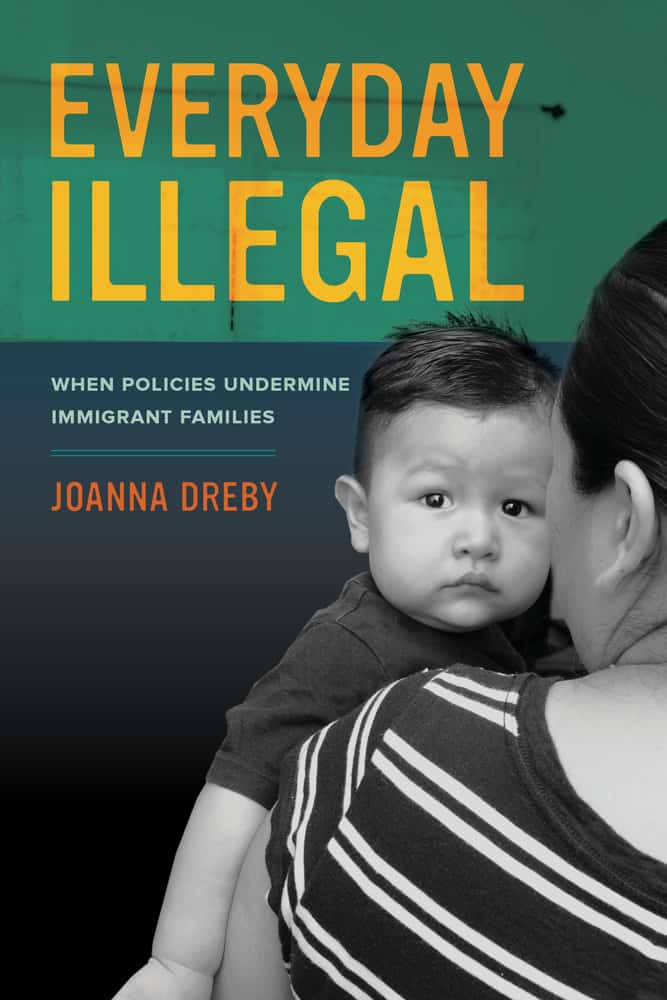By Joanna Dreby, author of Everyday Illegal: When Policies Undermine Immigrant Families
I share in the collective horror at reports about the Trump Administration’s newest administrative policy at the U.S. Mexican border: the separation of parents from children, many of whom are seeking political asylum in the United States. As a recap: refugees (those fleeing violence) receive refugee status prior to arriving on U.S. soil, while those who will claim political asylum (also fleeing violence) do so after arriving to the United States. The process involves appearing before an immigration judge and stating the intent to apply for asylum and, generally after being released until the next hearing, finding a lawyer who will help file what is an extremely involved petition. Due to the influx of migrants from Central America during the Obama Administration, some of those who arrived at the U.S. Mexican border were detained for lengthy periods before appearing in immigration court. Parents and children were housed together, at times in extremely inhumane detention facilities.
 The new administration has begun a zero tolerance policy for border crossers. Today anyone picked up at the border will be criminally prosecuted for unauthorized entry prior to being able to state their intent to apply for political asylum in immigration court. The result is that parents traveling with children are now being forcibly separated. While parents are prosecuted for the criminal violation of unauthorized entry, children are removed from their care and – now considered unaccompanied minors – become the responsibility of the Department of Human Services (DHS) who will, we are being told, place children in foster care until their parents are released. And, it seems according to a report in The Washington Post, that parents are being told that they will be reunited with their children quickly if they plead guilty to unauthorized entry. Pleading guilty to a criminal offense is a strike against any petition for political asylum. Parents who are following the process laid out by U.S. immigration law are being penalized through forced the separation from their children.
The new administration has begun a zero tolerance policy for border crossers. Today anyone picked up at the border will be criminally prosecuted for unauthorized entry prior to being able to state their intent to apply for political asylum in immigration court. The result is that parents traveling with children are now being forcibly separated. While parents are prosecuted for the criminal violation of unauthorized entry, children are removed from their care and – now considered unaccompanied minors – become the responsibility of the Department of Human Services (DHS) who will, we are being told, place children in foster care until their parents are released. And, it seems according to a report in The Washington Post, that parents are being told that they will be reunited with their children quickly if they plead guilty to unauthorized entry. Pleading guilty to a criminal offense is a strike against any petition for political asylum. Parents who are following the process laid out by U.S. immigration law are being penalized through forced the separation from their children.
Research is conclusive about the impacts of forced separations of young children from their parents. There is no question among psychologists, social workers and other health professionals that children need security, and that bonds with parents are paramount to child development. Forced separation induces high levels of insecurity, especially when parents and children have no idea when they will be reunited. There are short-term psychological impacts, such as bed wetting, as well as long-term effects – internalizing and externalizing behaviors like depression, anxiety, and acting out. This policy is not good for children, for parents or for families.
Of course, there are other reasons to be concerned. How will foster homes be found for children? Who will pay for their care? DHS has struggled to handle caseloads of unaccompanied minors, most of whom are teenagers. How will they handle an influx of even younger children into the child welfare system?
Humanitarian and practical concerns aside, let us be clear: the policy is not really about those experiencing the trauma of forced separations. For the administration, they are collateral damage. As has been announced, the intent of the policy is to discourage people from coming to the United States. The intent is to instill the fear of separation among parents and children alike.
And in this way, the policy is not all that different from other immigration enforcement policies that the U.S. has adopted over the past 10 to 15 years. As I write about in my book, Everyday Illegal, enforcement policies that detain and deport parents create fears of family separation. But it is not only the undocumented who experience fear, but rather U.S. citizen children and even children of legal migrant express these fears. Policies playing off the fears of family separation impact a much wider swath of the population than anticipated. Policies that instill fears of family separation impact us all.
In this same way, we should view this new unapologetically harsh policy of the Trump Administration as another iteration of U.S. immigration policy characteristic of the 21st century. Our government has used the fear of family separation to terrorize a segment of the population: U.S. citizen children living with parents who have migrated to the United States. It is also, now, using the fear of family separation to police our borders. Just as the threat of deportation has devastating consequences, even for those who are U.S. citizens, we can be sure that this new threat of separation will not only change the lives of those who cross the border without inspection. It contributes to a new normal in which we collectively accept that our government uses the terror of family separation to regulate our population. And that is not good for any family in the United States, regardless of citizenship status.


